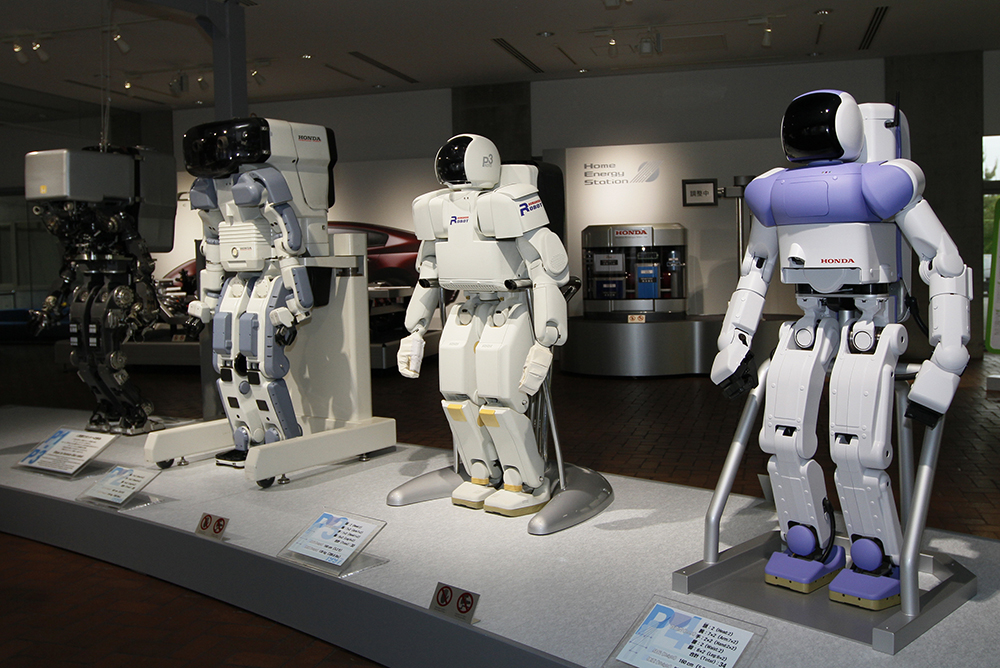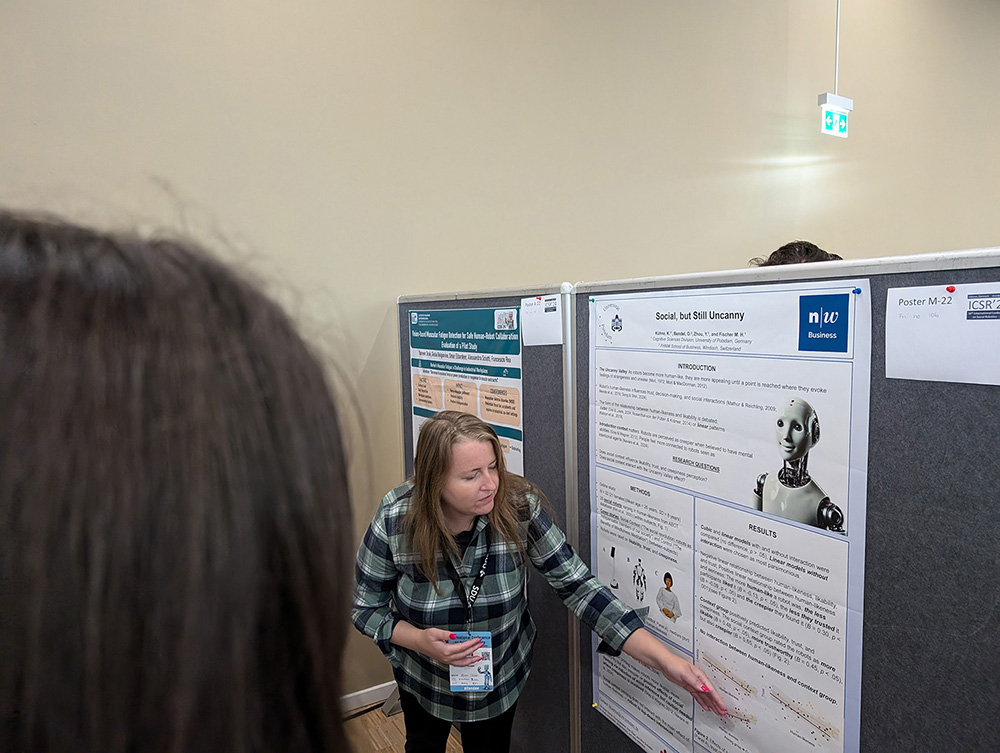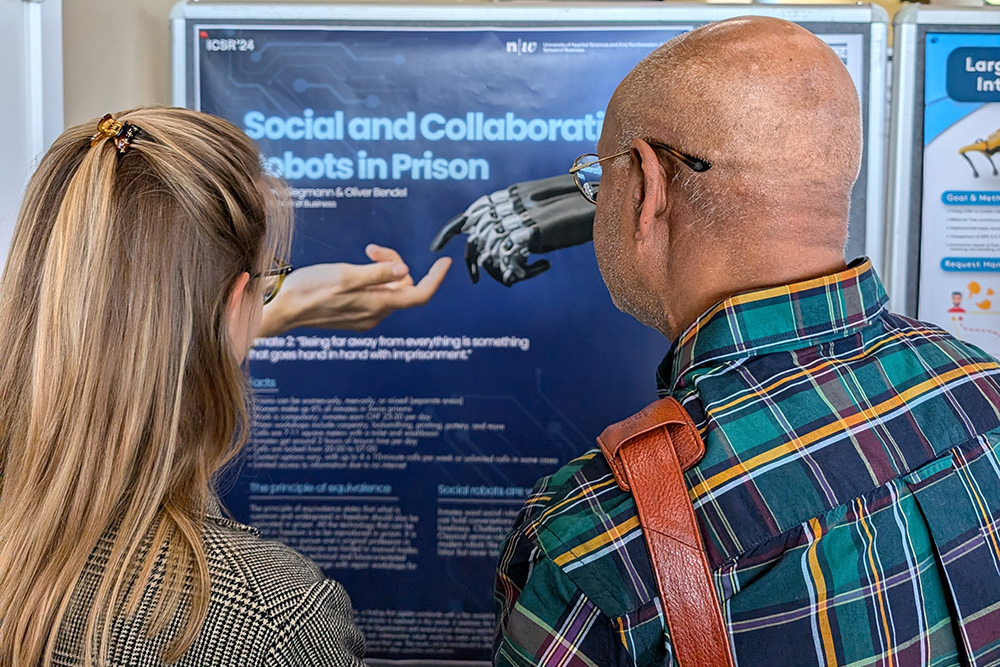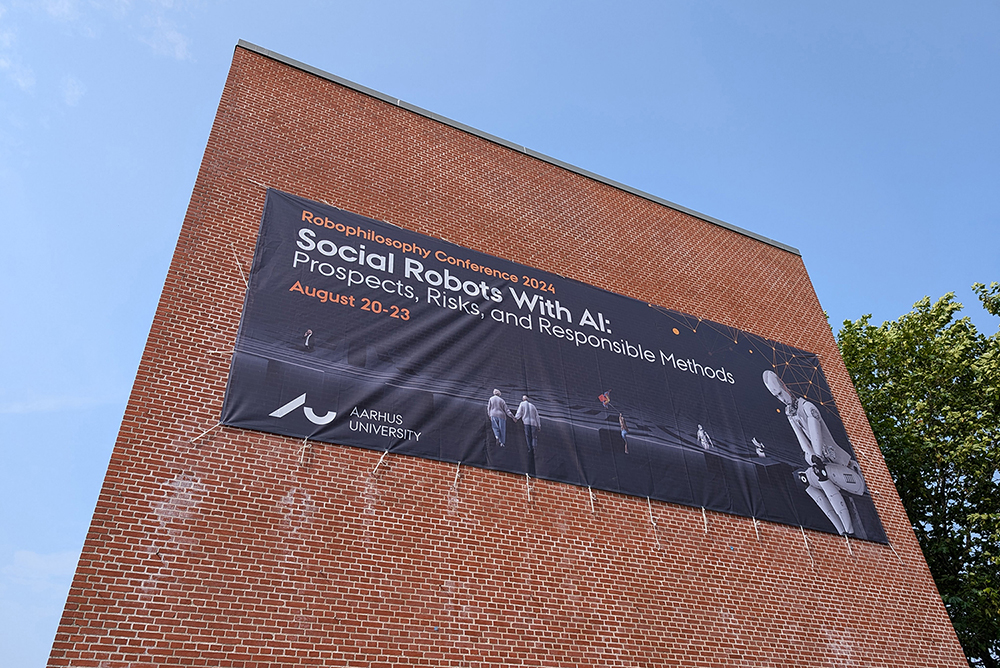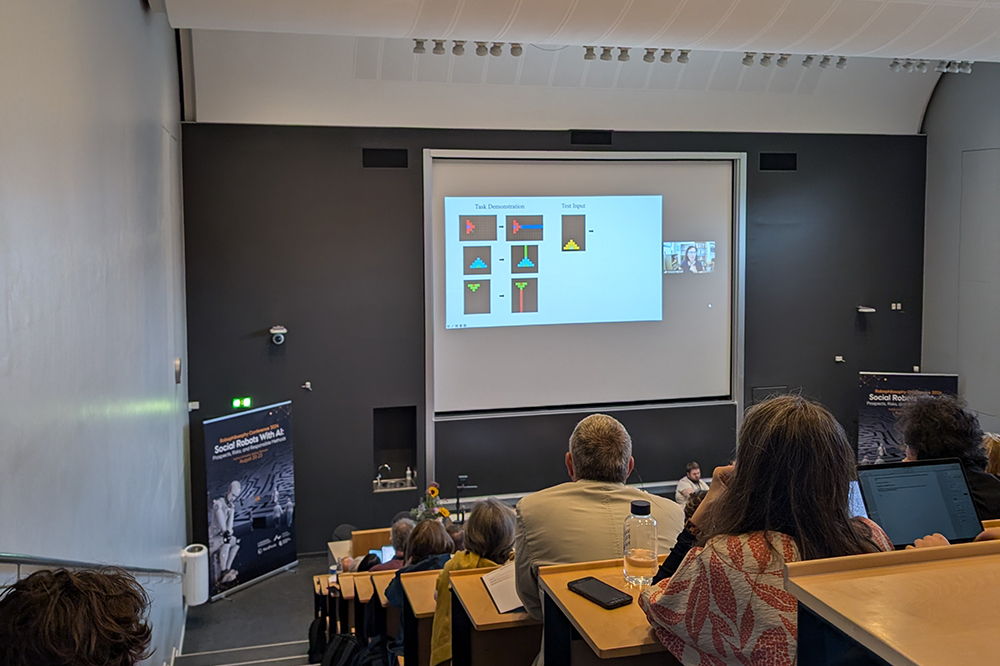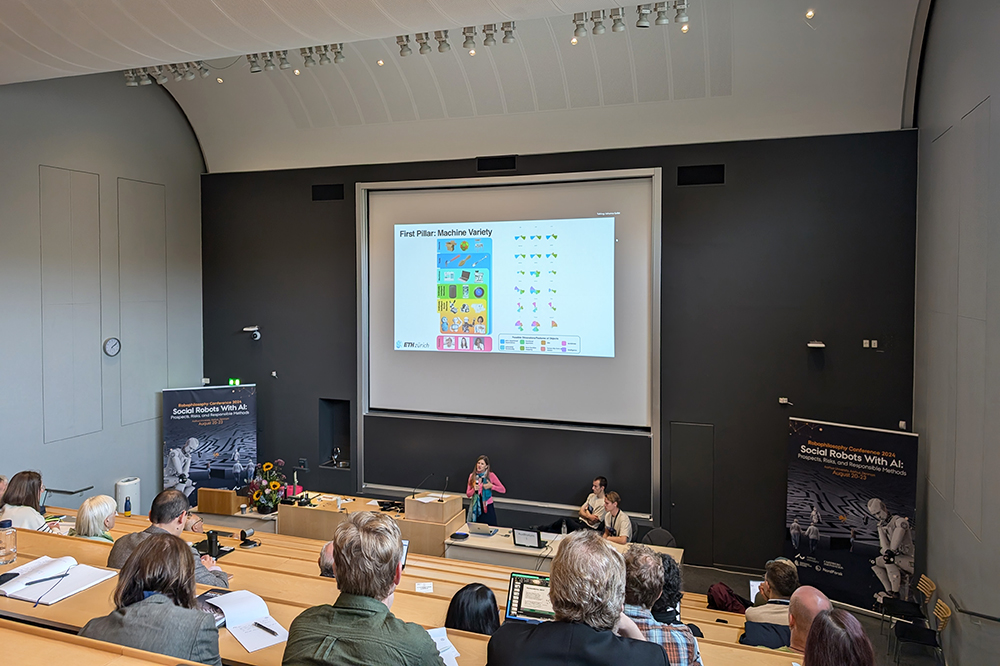According to several media reports, humanoid robots will take part in a half marathon together with humans for the first time in Beijing in April 2025. Around 12,000 people will run the 21-kilometre course, accompanied by robots from more than 20 companies worldwide. The robots must look humanoid, be able to move on two legs, and be between 0.5 and 2 metres tall. The majority of the larger models are likely to be so-called all-purpose robots. Both remote-controlled and autonomous robots are permitted – with the option of changing batteries during the race. The premiere is part of a broader strategy by China to promote humanoid robots to achieve technological independence, boost the economy, and compete in the global technology race, especially with the US. Last year, the humanoid robot Galbot had already supported a marathon final, but this time the machines are running the full distance (Photo: Morio, CC BY-SA 3.0).
Trump is Guarded by Spot
Spot from Boston Dynamics is the latest tool in the arsenal of the US Secret Service. This was reported by the BBC on November 17, 2024. The robot was recently spotted patrolling the perimeter of President-elect Donald Trump’s Mar-a-Lago resort in Palm Beach, Florida. As the video on the website shows, they do not carry weapons; “and each can be controlled remotely or automatically – as long as its route is pre-programmed”. Passers-by are warned by a sign on each of Spot’s legs that reads, “DO NOT PET”. “I don’t know that anyone would be tempted to pet these robot dogs. They do not look cuddly,” Melissa Michelson, a political scientist at Menlo College, told the BBC. Oliver Bendel, an expert in social robotics at the FHNW School of Business, disagrees. He has been working with Unitree Go2, which is half the weight and smaller than SPOT but otherwise comparable, since 2023. “The students are initially amazed or shocked when they see it. After a minute or two, their doubts are dispelled and they try to lure it in and stroke it.” A robot like Spot is well suited to an estate like Mar-a-Lago. However, models such as K5 from Knightscope or RBwatcher from Robotnik/URG can also be used on the lawns.
Social Robots in Olten
The elective module “Social Robots” by Prof. Dr. Oliver Bendel took place from November 4 to 6, 2024 at the Olten Campus. Tamara Siegmann (with the online presentation of the paper “Social and Collaborative Robots in Prison”) was invited as a guest speaker. She made it clear to those present that every member of the university can make a contribution to research. On site were Pepper and NAO from the FHNW Robo Labs as well as Unitree Go2, Alpha Mini, Cozmo, Furby, and Booboo (aka Boo Boo) from Oliver Bendel’s privately funded Social Robots Lab. Unitree Go2 – also called Bao (Chinese for “treasure, darling”) by the lecturer – and Booboo were particularly well received. At the end of the elective module, the students designed social robots – also with the help of generative AI – that they found useful, meaningful or simply attractive. The elective modules have been offered since 2021 and are very popular.
The Uncanny Social Robot
The uncanny valley effect is a famous hypothesis. Whether it can be influenced by context is still unclear. In an online experiment, Katharina Kühne and her co-authors Oliver Bendel, Yuefang Zue, and Martin Fischer found a negative linear relationship between a robot’s human likeness and its likeability and trustworthiness, and a positive linear relationship between a robot’s human likeness and its uncaniness. “Social context priming improved overall likability and trust of robots but did not modulate the Uncanny Valley effect.” (Abstract) Katharina Kühne outlined these conclusions in her presentation “Social, but Still Uncanny” – the title of the paper – at the International Conference on Social Robotics 2024 in Odense, Denmark. Like Yuefang Zue and Martin Fischer, she is a researcher at the University of Potsdam. Oliver Bendel teaches and researches at the FHNW School of Business. Together with Tamara Siegmann, he presented a second paper at the ICSR.
Robots in Prison
On October 22, 2024, Tamara Siegmann and Prof. Dr. Oliver Bendel (School of Business FHNW) presented their project “Robots in Prison” at the ICSR in Odense (Denmark). They investigated whether collaborative and social robots can and should be used in prisons. One result was that modern industrial robots such as cobots and classic service robots such as transportation and cleaning robots hardly create any added value. Instead, they take work away from inmates. In contrast, social robots are conceivable and useful. They bring something to imprisonment that is common in freedom. And – an important point for resocialization – they can combat the loneliness of inmates. The International Conference on Social Robotics is the most important conference for social robotics alongside Robophilosophy. The paper “Social and Collaborative Robots in Prison” will be published in a proceedings volume by Springer at the end of the year.
Robotics in Retail
September 25, 2024 was the first day of the AI & Robotics4Retail Conference 2024 in Bonn. It was part of the “ECR Day 2024”, which took place at the World Conference Center. Numerous practical presentations provide an insight into the most important AI and robotics topics in retail at the moment and provide important ideas for projects in your own company, according to the website. The keynote speech was given by Prof. Dr. Oliver Bendel on the topic of “Service robots from a technical, economic and ethical perspective”. From the description: “Service robots have become widespread as cleaning, transportation, and security robots. As vacuum and mopping robots, they can be found in households, airports and hotels. As transport robots, they move around factories and warehouses, move between the buffet and kitchen in restaurants or bring orders to customers in cities. In the form of social robots, they advise and serve us in shopping malls or entertain our children while we shop. Universal robots, human-like machines that help in production and logistics in the morning, dig up the garden in the afternoon and play tennis with us in the evening, are just around the corner. They are connected to multimodal language models that enable or improve their control and perception. The talk presents use cases of this kind, classifies them from a technical, economic and ethical perspective, and takes a look into the future.” Further information about www.robotics-konferenz.de.
Closing Event of a Successful Conference
Robophilosophy 2024 took place for three and a half days in Aarhus (Denmark). It is a biennial dedicated to social robotics. Alongside the ICSR, it is the most important conference in this field. The program was again very extensive. Workshops were held and presentations given in four different tracks. There were keynotes and plenary sessions by well-known names, from Wendell Wallach to Hiroshi Ishiguro. After a sunny start, it began to rain, which made it all the easier to concentrate on the scientific exchange. In the end, the sun came out again in time for the closing event. Johanna Seibt, the brains behind Robophilosophy, received a bouquet of flowers and a standing ovation. The experts will meet again in two years’ time. Where has not yet been decided. A few potential hosts spoke up. Edinburgh would be an option, but so would California.
The Rainbow Above the Museum
The Robophilosophy community consists of philosophers, psychologists, roboticists, and representatives of other disciplines. It is a tradition for everyone to come together for a social event to get new inspiration and chat about their work and motivation in an informal atmosphere. This time, they attended a robot performance in the theater on the second day. On the third day, the conference dinner was held together in the rooftop restaurant of the AROS Art Museum. One of the highlights was the tour of the ninth floor. The Danish-Icelandic artist Olafur Eliasson has created Your rainbow panorama which was officially opened in May 2011. You can see Aarhus with its church towers, residential buildings, streets, and people through the colorful panes. Afterwards, the tireless went out into the city’s nightlife.
Keynote by Melanie Mitchell
On the third day of Robophilosophy 2024, Melanie Mitchell, Professor at the Santa Fe Institute (USA), gave a keynote speech entitled “AI’s Challenge to Understanding the World”. From the abstract: “I will survey a debate in the artificial intelligence (AI) research community on the extent to which current AI systems can be said to “understand” language and the physical and social situations language encodes. I will describe arguments that have been made for and against such understanding, hypothesize about what humanlike understanding entails, and discuss what methods can be used to fairly evaluate understanding and intelligence in AI systems.” (Website Robophilosophy 2024) In this keynote – as in previous keynotes and presentations – the restrictions of AI and generative AI were emphasized. In response to a question from an audience member, the potential was also acknowledged.
Keynote by Emily Cross
On the third day of Robophilosophy 2024, Emily Cross, a dancer and cognitive neuroscientist from ETHZ, gave a keynote speech entitled “Mind Meets Machine – Neurocognitive Perspectives on Human-Robot Interaction”. From the abstract: “Understanding how we perceive and interact with others is a core challenge of social cognition research. This challenge is poised to intensify in importance as the ubiquity of artificial intelligence and the presence of humanoid robots in society grows. This talk examines how established theories and methods from psychology and neuroscience are revealing fundamental aspects of how people perceive, interact with, and form social relationships with robots. Robots provide a resolutely new approach to studying brain and behavioural flexibility manifest by humans during social interaction. As machines, they can deliver behaviours that can be perceived as “social”, even though they are artificial agents and, as such, can be programmed to deliver a perfectly determined and reproducible set of actions. As development of service robots, home companion robots and assistance robots for schools, hospitals and care homes continues apace, whether we perceive such machines as social agents and how we engage with them over the long term remains largely unexplored. This talk describes research that bridges social cognition, neuroscience and robotics, with important implications not only for the design of social robots, but equally critically, for our understanding of the neurocognitive mechanisms supporting human social behaviour more generally.” (Website Robophilosophy 2024)
